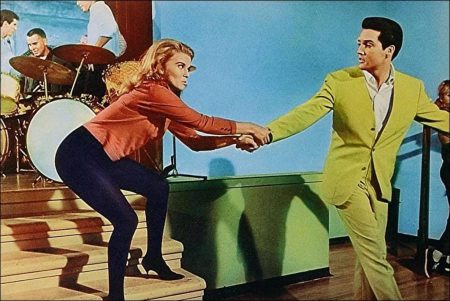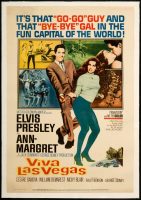Viva Las Vegas movie storyline. Sports car enthusiast Lucky Jackson defeats Italian champion Count Elmo Mancini, who then asks Lucky to drive for him. Lucky refuses and plans to get a new engine and race his own car in the Las Vegas Grand Prix. When Lucky and Mancini arrive in Las Vegas, they are both attracted to Rusty Martin, a hotel swimming instructor.
Lucky loses his money when he is pushed into a pool, and he takes a job as a waiter in order to pay his bills. Rusty, falling in love with Lucky, tries to persuade him to give up racing, and she flirts with Mancini to make Lucky jealous. Lucky enters the hotel talent contest but only ties with Rusty. Instead of the necessary cash, Rusty receives a pool table and Lucky, a honeymoon. Hours before the Grand Prix, Rusty’s father, who has always been interested in racing, secretly borrows the money for Lucky. Mancini’s car crashes, and Lucky goes on to win the race and marry Rusty.
Performers and additional songs : “Yellow Rose of Texas,” “What’d I Say,” “I Need Somebody To Lean On” (Lucky); “My Rival” (Rusty); “The Lady Loves Me” (Lucky and Rusty); “The Eyes of Texas Are Upon You” (Lucky and chorus); “The Climb” (quartet).
Viva Las Vegas is a 1964 American musical film directed by George Sidney and starring Elvis Presley and Ann-Margret. The film is regarded by fans and film critics as one of Presley’s best films, and it is noted for the on-screen chemistry between Presley and Ann-Margret. It also presents a strong set of ten musical song-and-dance scenes choreographed by David Winters and features his dancers. Viva Las Vegas was a hit at film theaters, as it was #14 on the Variety year end box office list of the top-grossing films of 1964.
Viva Las Vegas (1964)
Directed by: George Sidney
Starring: Elvis Presley, Ann-Margret, Cesare Danova, William Demarest, Nicky Blair, Jack Carter, Teri Garr, The Jubilee Four, George Cisar, Robert Aiken, Red West
Screenplay by: Sally Benson
Cinematography by: Joseph F. Biroc
Film Editing by: John McSweeney, Jr.
Costume Design by: Donfeld
Set Decoration by: Henry Grace, George R. Nelson
Art Direction by: Edward C. Carfagno, George W. Davis
Music by: George E. Stoll
MPAA Rating: None.
Distributed by: Metro-Goldwyn-Mayer
Release Date: May 20, 1964 (US)
Views: 192

